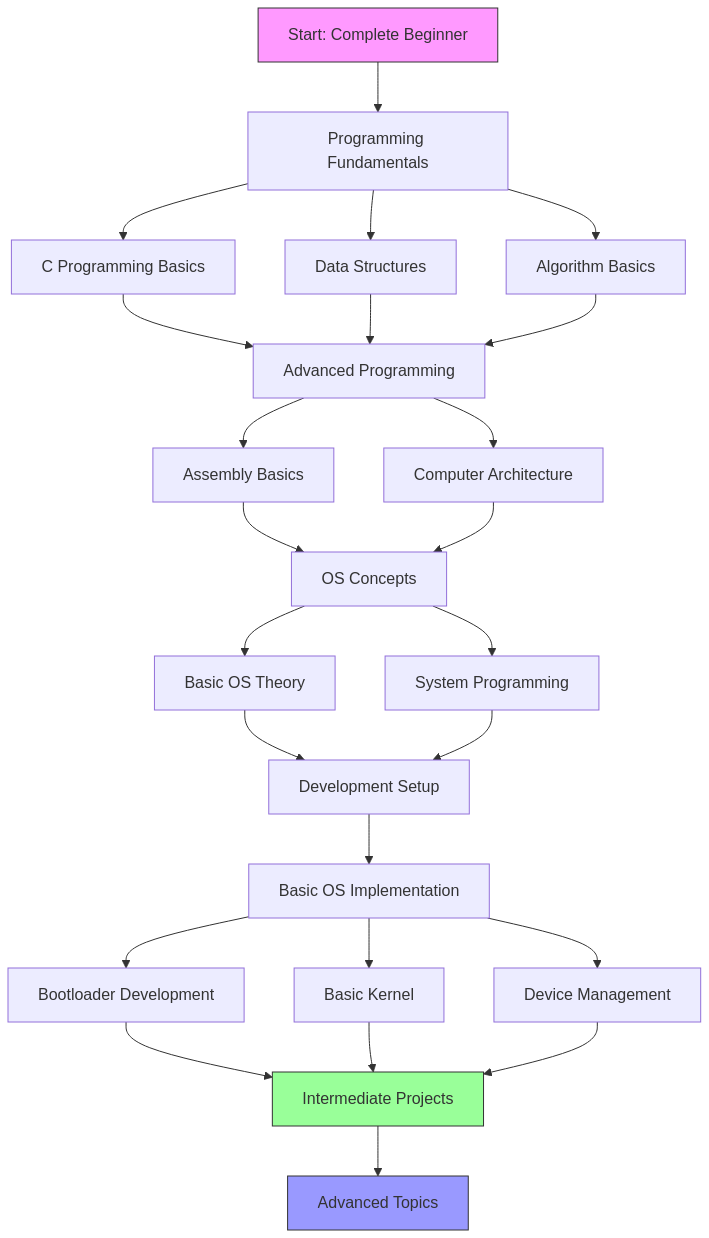Operating System Development Roadmap (Beginner Path)
How to Follow?
Phase 1: Programming Fundamentals
1.1 C Programming Basics
- Introduction to Programming
- CS50's Introduction to Programming
- Learn C - Interactive Tutorial
-
Basic Syntax and Control Structures
- C Programming Language Tutorial
- W3Schools C Tutorial
-
Variables and Data Types
- C Data Types Guide
- Variables in C Programming
- Practice: Create programs using different data types
1.2 Intermediate C Programming
- Functions and Program Structure
- Functions in C
- Program Structure Tutorial
-
Practice: Create modular programs
-
Arrays and Strings
- Array Operations in C
- String Handling
-
Practice: String manipulation programs
-
Pointers Basics
- Understanding Pointers
- Pointer Tutorial
- Practice: Basic pointer operations
1.3 Advanced C Programming
- Advanced Pointer Concepts
- Pointer to Pointer
- Function Pointers
-
Practice: Complex pointer programs
-
Memory Management
- Dynamic Memory Allocation
- Memory Layout
-
Practice: Memory allocation programs
-
File Operations
- File Handling in C
- Binary File Operations
- Practice: File handling programs
1.4 Data Structures
- Basic Data Structures
- Arrays and Linked Lists
- Stack and Queue
-
Practice: Implement basic data structures
-
Advanced Data Structures
- Trees and Graphs
- Hash Tables
- Practice: Implement complex data structures
1.5 Assembly Language Basics
- Introduction to Assembly
- NASM Tutorial
- x86 Assembly Guide
-
Practice: Basic assembly programs
-
CPU Architecture
- CPU Registers
- Instruction Set Reference
-
Practice: Register manipulation
-
Memory Addressing
- Memory Addressing Modes
- Segmentation
- Practice: Memory access programs
Phase 2: Computer Architecture
2.1 Basic Computer Organization
- CPU Components
- CPU Architecture
-
Memory System
- Memory Hierarchy
- Cache Memory
2.2 I/O Systems
- Basic I/O Concepts
- I/O Architecture
-
Interrupt Handling
- Interrupt Basics
- PIC Programming
Phase 3: Operating System Concepts
3.1 OS Basics
- OS Structure
- OS Components
-
Process Management
- Process Concepts
- Thread Management
3.2 Memory Management
- Virtual Memory
- Virtual Memory Concepts
-
Memory Allocation
- Memory Allocation Algorithms
- Paging Implementation
Phase 4: OS Development Basics
4.1 Development Environment
- Tool Setup
- Cross Compiler Setup
-
Debugging Tools
- GDB Basics
- OS Debugging Tips
4.2 Bootloader Development
- BIOS Programming
- BIOS Interrupts
-
Protected Mode
- Protected Mode
- GDT Setup
4.3 Basic Kernel Development
- Kernel Entry
- Kernel Basics
-
Basic Drivers
- VGA Text Mode
- Keyboard Driver
Beginner Projects (In Order)
- Hello World in Assembly
-
Basic Bootloader
-
Simple Kernel
-
Memory Management
-
Basic Shell
- Writing a Shell
Online Courses
- CS50: Introduction to Computer Science
- Nand2Tetris
- Introduction to Operating Systems by Georgia Tech
- MIT OCW 6.828: Operating System Engineering
Books
- "C Programming Language" by Kernighan and Ritchie
- "Modern Operating Systems" by Andrew S. Tanenbaum
- "Operating Systems: Three Easy Pieces" by Remzi H. Arpaci-Dusseau
- "Computer Organization and Design" by Patterson and Hennessy
- "Operating System Concepts" by Silberschatz, Galvin, and Gagne
Research Papers
- "The Evolution of Operating Systems"
- "Understanding the Linux Virtual Memory Manager"
- "The Design of the Unix Operating System"
- "An Overview of the Singularity Project"
- "Interrupts and Interrupt Handling"
Additional Resources
Community Resources
Development Tools
- Text Editors/IDEs
- Visual Studio Code with C/C++ extension
- Eclipse CDT
-
CLion
-
Debugging Tools
- GDB
- BOCHS Debugger
-
QEMU Monitor
-
Build Tools
- Make
- CMake
-
NASM/YASM
-
Testing Tools
- Unit Testing Frameworks
- QEMU for OS Testing
- VirtualBox for Testing
Next Steps After Completion
- Study existing OS codebases
- Contribute to open-source OS projects
- Explore advanced topics:
- Real-time operating systems
- Embedded systems
- Distributed systems
📊 Analytics
View Dashboard →📈 This page is being tracked with GoatCounter. Click here to view detailed analytics including page views, referrers, and visitor statistics.
